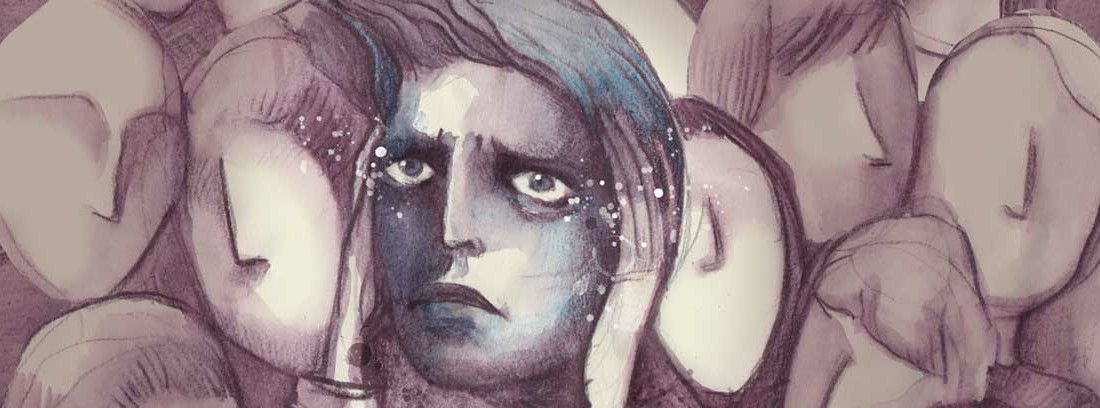Can mental disorders be inherited?

According to the (WHO), 25% of the world population develops at some point in life, one or more mental diseases resulting in disability. However, mental disorders continue to be a difficult issue to address on a social level and this causes, on occasions, the relatives of those affected to hide doubts or feelings related to the pathologies of their relatives. One of the most frequently asked questions is: can mental disorders be inherited? Will I develop the same as my father / brother / uncle ...?
What factors determine mental health?
It is true that epidemiology speaks, and having a family member with a mental disorder is one of the predisposing factors to suffer it, but ... is my destiny written? The answer is no. Just as in many physical diseases we know the determining role that genetic inheritance has to develop them or not, the same does not happen in them. In psychiatric pathologies such as depression, schizophrenia or, what is inherited is not the pathology itself, but the predisposition to have it. In other words, a high genetic load generates more susceptibility to suffering from a psychiatric disorder, but it is not a direct cause to develop it.
For example, the probability that a person has schizophrenia is 1%. If one of the parents suffers from it, the probability rises to 13%, and if both parents have it, to 36%. However, no matter how likely it is, the person may never develop the disease. So, what other factors influence, apart from genetic inheritance? The psychiatric pathologies are multifactorial, that is, they have multiple causes. These causes are basically of three types, "bio-psycho-social":
biological factors
- Genetics.
- Infections
- Brain defects or injuries.
- Prenatal damage.
- Others: for example, malnutrition or exposure to certain toxins (for example, lead).
Psychological factors
- Serious trauma due to psychological, physical, or sexual abuse.
- Negligence in care and basic needs.
- Social isolation or lack of social skills.
- Lack of emotional regulation.
- Low self-esteem.
- Poor coping strategies.
- Excess of responsibility at an early age.
- Overly rigid or overprotective educational models.
Environmental factors
- Stress.
- Substance abuse (own or parental).
- Major losses (due to change of job, school, etc.).
- Duel.
- Divorce or separation of important family members.
- Dysfunctional family relationships.
- Socio-economic difficulties.
- Bullying
- Natural disasters.
- Growing up in an urban setting increases the chances of mental illness compared to a rural setting.
It should be noted that it is sometimes difficult to define the extent to which the determining factors have a biological origin or are something learned. For example, is the adolescent who initiates schizophrenia having a schizophrenic father, is it due to genetics transmitted by the parent or because he has grown up in an environment subject to educational guidelines and family interactions with interference from psychopathology?
Protective factors
In the same way that there are factors that increase the probability of activating mental illnesses, there are also protective factors that reduce the risk of suffering them. In any case, they are not decisive either, so you can have all of them and end up developing psychopathology. Some of these protective factors would be:
- Growing up from secure attachment.
- Affectivity and closeness in the environment.
- Be listened to and respected in one's own idiosyncrasy.
- Social and family circle, people to turn to.
- Have healthy and regular lifestyle habits: physical exercise, taking care of nutrition, avoiding drugs, etc.
- Effective emotional management.
- Freedom to express yourself or make decisions relevant to your own life.
The importance of early detection
75% of mental disorders start before 24 years (more specifically 50% at puberty, before the age of 14) so it is essential to detect and treat any problems that may arise from the beginning, so that they do not reach adulthood or arrive as attenuated as possible. In order to detect pathologies in time, some criteria to take into account would be:
- In teens and adults, the first sign that something is wrong is often insomnia. In children, inattention.
- Sudden changes in habits or in the way of behaving.
- Isolation and social rejection.
- Physical symptoms without organic explanation.
It is essential to consult with a and not silence possible alarm signals. Time will row in our favor.
What you should know:
- A high genetic load makes us more susceptible to suffering from a psychiatric disorder, but it is not a direct cause to develop it.
- Psychiatric pathologies are multifactorial, that is, they have multiple causes. These causes are basically of three types: "biological-psychological-social".
- 75% of mental disorders start before the age of 24, (50% before 14), so it is essential to detect and treat from the beginning any problems that may arise
Specialist in Clinical Psychology
(Updated at Apr 14 / 2024)